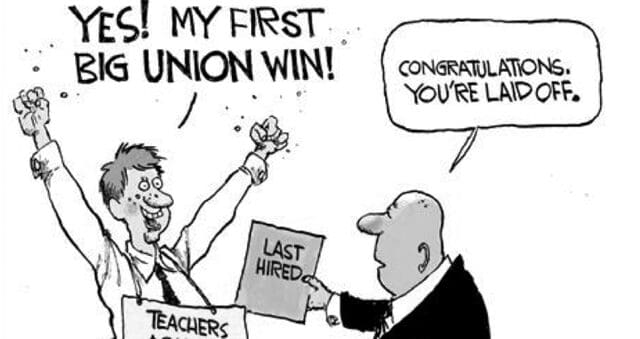Business Leaders Shun States with Powerful Public Unions
Why is this article important to teachers? As the National Institute for Labor Relations Research has proved time after time, businesses pick Right to Work states when they are thinking of expanding and populations follow jobs. Without population student populations decrease, and without students, teachers aren’t in demand.
It is interesting to note that there are 4 states where nonunion independent educator groups have more members than their respective states’ NEA affiliate: Texas, Georgia, Mississippi and Missouri. Of the 4, the first 3 states outlaw monopoly bargaining for teachers.

Steve Malanga has the story in Public Sector, Inc.
Chief Executive magazine has released its annual survey of states that business executives say are the best for business, and the worst. It’s no surprise that, over the years, business leaders have often expressed preferences for states with low levels of unionization. But as private worker union rates decline virtually everywhere, and unionization remains essentially a nonfactor in some growing industries like high tech, what’s notable about the list is how the majority of states favored by firms have significantly lower rates of government worker unionization, too, according to unionstats.org

Maybe this is just an artifact of the overall power unions once had in these states. But the spread between New York, the second most unpopular state, and Texas, the state voted best for business, on government worker unionization rates is 50 percentage points. There is, of course, nothing remotely like that in any comparison of private union rates by state.
As the chart above shows, only one of the most-preferred states, Nevada, has a government worker union rate above the national average, while only one of the least-preferred states, Maryland, is below the average.
Some of the sentiment behind these rankings may be reflective of the focus of business leaders in the poll on fiscal issues, including debt and pension liabilities. As one CEO said of Illinois: “A complete and utter disaster when it comes to fiscal management.”
A number of comments by executives in the survey focused on the anti-business attitude of state employees. This remark about the three least-regarded states pretty much sums things up:
“NY, CA, & IL make it hard to desire to do business there due to deeply-rooted and ineffective socialist bureaucrats who get in the way with their secular social engineering and inherent distrust of business. They represent ‘ankle weights’ to focused business people trying to serve others with value, quality, and responsiveness.
Another exec groused about the same three states: “Even though they have the highest tax rates they have the worst services–go figure.”
Maryland won plaudits for the quality of its workforce and its strategic position neighboring the federal government. But it scores low on tax rates and regulations, and the trend there disturbed businesses, given recent tax increases.
